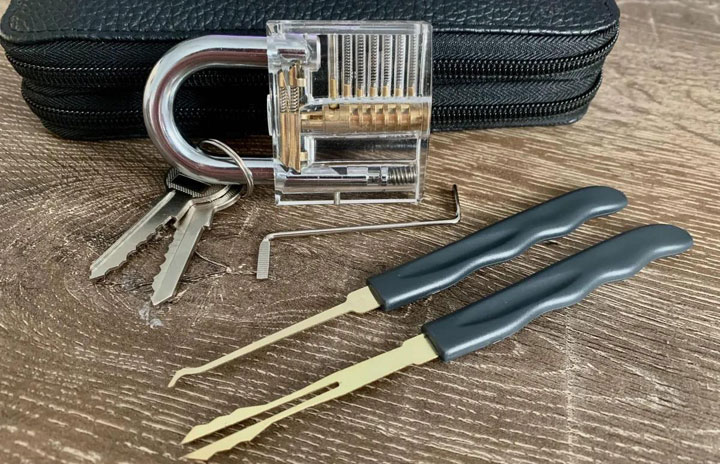Lock Picking and the Law: Understanding Legal Boundaries
2025-04-01 15:35
Lock picking has long been associated with crime, but it is also a legitimate skill practiced by locksmiths, security professionals, and hobbyists. While some see it as an art or a practical ability for emergencies, legal systems worldwide regulate the possession and use of lock picking tools to prevent unlawful activities. Understanding the legal boundaries of lock picking is crucial to ensuring that individuals engage in it responsibly and within the limits of the law.
The Legality of Lock Picking
The legality of lock picking varies from country to country and even between different regions within a country. In general, possession of lock picking tools is not inherently illegal in many places, but their use with criminal intent is strictly prohibited. Laws often distinguish between professional locksmiths, hobbyists, and criminals, leading to different legal consequences depending on the intent and circumstances of use.
In the United States, laws regarding lock picking tools differ by state. Some states, such as California and Illinois, have laws that classify lock picking tools as "burglary tools," making possession illegal if there is evidence of intent to commit a crime. Other states allow possession but impose severe penalties for using the tools unlawfully. Similarly, in Canada, lock picking tools are not illegal to own, but their possession can become an offense if used for criminal purposes.
European countries have diverse regulations as well. In the United Kingdom, lock picking tools are legal to own, but their possession in public without a valid reason may be considered an offense under the Theft Act of 1968. Germany and France have similar restrictions, where ownership is legal, but improper use can lead to criminal charges. In contrast, some countries, such as Japan, have stricter laws that criminalize the possession of lock picking tools without specific authorization.
Lock Picking as a Hobby and Profession
Lock picking is not just a tool for criminals; it is a recognized skill in many professions. Certified locksmiths undergo training to learn how to pick locks legally to assist customers who are locked out of their homes, vehicles, or businesses. These professionals must often obtain licensing and comply with strict legal requirements to practice their trade. Those interested in becoming locksmiths often need to buy lock picking tools from reputable sources to train and develop their skills in a lawful manner.
In addition to professionals, lock picking has gained popularity as a hobby. The "locksport" community consists of enthusiasts who engage in lock picking as a challenge, similar to solving a puzzle. They participate in competitions, share knowledge, and even contribute to improving lock security. Many locksport practitioners advocate for responsible lock picking, emphasizing that the skill should only be used in ethical and legal contexts.
Legal Risks and Consequences
Despite its legitimacy in certain contexts, lock picking can carry significant legal risks if misused. Individuals caught using lock picking tools for unauthorized entry or with criminal intent can face severe penalties, including fines, imprisonment, and criminal records. Even if no crime is committed, possessing lock picking tools in suspicious circumstances may lead to legal trouble.
To avoid legal issues, those interested in lock picking should research local laws and ensure they comply with legal requirements. Locksmiths should obtain proper licensing, and hobbyists should practice only in controlled environments, such as their own property or with explicit permission from property owners. Carrying lock picking tools in public without a valid reason can be risky, so it is advisable to transport them only when necessary for professional or educational purposes.
Conclusion
Lock picking exists at the intersection of legality and utility. While it serves as an essential skill for locksmiths and a fascinating hobby for enthusiasts, it is also closely monitored by legal authorities due to its potential misuse. Understanding and respecting the laws surrounding lock picking is crucial for anyone interested in the practice. By adhering to legal boundaries and ethical guidelines, individuals can enjoy the art of lock picking responsibly while avoiding any legal repercussions.
The Legality of Lock Picking
The legality of lock picking varies from country to country and even between different regions within a country. In general, possession of lock picking tools is not inherently illegal in many places, but their use with criminal intent is strictly prohibited. Laws often distinguish between professional locksmiths, hobbyists, and criminals, leading to different legal consequences depending on the intent and circumstances of use.

In the United States, laws regarding lock picking tools differ by state. Some states, such as California and Illinois, have laws that classify lock picking tools as "burglary tools," making possession illegal if there is evidence of intent to commit a crime. Other states allow possession but impose severe penalties for using the tools unlawfully. Similarly, in Canada, lock picking tools are not illegal to own, but their possession can become an offense if used for criminal purposes.
European countries have diverse regulations as well. In the United Kingdom, lock picking tools are legal to own, but their possession in public without a valid reason may be considered an offense under the Theft Act of 1968. Germany and France have similar restrictions, where ownership is legal, but improper use can lead to criminal charges. In contrast, some countries, such as Japan, have stricter laws that criminalize the possession of lock picking tools without specific authorization.
Lock Picking as a Hobby and Profession
Lock picking is not just a tool for criminals; it is a recognized skill in many professions. Certified locksmiths undergo training to learn how to pick locks legally to assist customers who are locked out of their homes, vehicles, or businesses. These professionals must often obtain licensing and comply with strict legal requirements to practice their trade. Those interested in becoming locksmiths often need to buy lock picking tools from reputable sources to train and develop their skills in a lawful manner.

In addition to professionals, lock picking has gained popularity as a hobby. The "locksport" community consists of enthusiasts who engage in lock picking as a challenge, similar to solving a puzzle. They participate in competitions, share knowledge, and even contribute to improving lock security. Many locksport practitioners advocate for responsible lock picking, emphasizing that the skill should only be used in ethical and legal contexts.
Legal Risks and Consequences
Despite its legitimacy in certain contexts, lock picking can carry significant legal risks if misused. Individuals caught using lock picking tools for unauthorized entry or with criminal intent can face severe penalties, including fines, imprisonment, and criminal records. Even if no crime is committed, possessing lock picking tools in suspicious circumstances may lead to legal trouble.
To avoid legal issues, those interested in lock picking should research local laws and ensure they comply with legal requirements. Locksmiths should obtain proper licensing, and hobbyists should practice only in controlled environments, such as their own property or with explicit permission from property owners. Carrying lock picking tools in public without a valid reason can be risky, so it is advisable to transport them only when necessary for professional or educational purposes.
Conclusion
Lock picking exists at the intersection of legality and utility. While it serves as an essential skill for locksmiths and a fascinating hobby for enthusiasts, it is also closely monitored by legal authorities due to its potential misuse. Understanding and respecting the laws surrounding lock picking is crucial for anyone interested in the practice. By adhering to legal boundaries and ethical guidelines, individuals can enjoy the art of lock picking responsibly while avoiding any legal repercussions.
 Promotion: 5% Discount Code: 5vip
Promotion: 5% Discount Code: 5vip